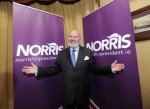
The controversies surrounding Norris ignore the senator’s cultural and moral achievements which have served to move the Irish state into the 21st century. No other candidate can boast such achievements worthy of presidency.
It’s a shame that the media’s reporting of the presidential campaign leaves the voters who only have a flirting interest in the campaign left to decide on an appropriate President simply on the basis of (trivial) controversies involving the candidates.
Seán Gallagher is the unofficial candidate of the party that ruined this country, Mary Davis is the president for Corporate Ireland, Gay Mitchell is a loner, Dana writes bitchy letters, Martin McGuinness is a lying terrorist, David Norris finds a degree of justification in pederasty and Michael D. Higgins is a short arse who has to stand on a box to look important. Take your pick.
The unfortunate thing is that each candidate presented themselves to the electorate backed by strong public achievements, which aren’t deemed important enough to broadcast by the media and in some cases by themselves.
Gay Mitchell has advanced the cause of aid to developing nations within the European Parliament through his role in the Development Committee, Mary Davis was the CEO for the extremely successful Special Olympics held in Ireland in 2003, Michael D. Higgins received the Seán McBride peace prize in 1992 for his human rights campaigning for war torn countries, Seán Gallagher has used his business success to work with and donate to charities, Martin McGuinness has facilitated the continuing success of the Peace Process, and Dana, well, she sang for the Pope.
David Norris, meanwhile, brought and won a case against the Irish state in 1988 for the criminalisation of homosexual acts in the European Court of Human Rights after twice being ruled against in Ireland, first by the High Court and then by the Supreme Court.
 What sets Norris’ 14 year campaign apart is, while the deeds of the other candidates involved demonstrate great moral integrity and honesty, their acts were within the remit of the roles they had at the time. Mitchell and Higgins were empowered by their elected responsibilities to persevere with their humanitarian work, while McGuinness held the cocked gun in his hand, which he chose to lay down
What sets Norris’ 14 year campaign apart is, while the deeds of the other candidates involved demonstrate great moral integrity and honesty, their acts were within the remit of the roles they had at the time. Mitchell and Higgins were empowered by their elected responsibilities to persevere with their humanitarian work, while McGuinness held the cocked gun in his hand, which he chose to lay down
Norris, though, took on one of the most powerful institutions in the state long before they were discredited by a litany of child sex abuse scandals – all this while openly proclaiming himself a homosexual. To confront and fight against the pervasive Catholic Church in 1970s and 1980s Ireland took great moral courage and conviction.
Remember it is only this year that an Irish Taoiseach was finally seen to be standing up to the Catholic Church with Enda Kenny’s speech in July which concluded “the standards of conduct which the Church deems appropriate to itself, cannot and will not, be applied to the workings of democracy and civil society in this republic”. The European Court of Human Rights was telling the Irish state the same thing in 1988.
The epoch of the time deems Norris’ campaign all the more extraordinary. Liberal San Francisco only elected Harvey Milk – “the martyr for Gay Rights” – city supervisor in 1977 after three failed attempts. It was only six years later David Norris would take his failed attempt to the Supreme Court in staunchly Catholic Ireland.
All the candidates, Norris included, are guilty of over-estimating their reach if elected President of Ireland. Even in the minor powers bestowed on the nation’s first citizen to pass a Bill to the Supreme Court to test its constitutionality, very few Bills are put up for consideration for the President.
Even if a bill may be passed to the President, there’s a strong argument, the President should not refer the bill to the Supreme Court, as this prevents any law from being considered by the Supreme Court on its constitutionality in the future. 
With the restrictions on how the President operates, the decision of the electorate will be made on the basis of the candidate’s past record, what they represent and their personal traits, not on the role as guardian of the constitution or the power to dissolve the Dáil.
This justifies the publication of David Norris’ support for clemency for former lover, Ezra Nawi, which along with a series of other revelations, seems to have derailed Norris’ campaign. But these issues shouldn’t be the deciding issue on the integrity of Norris on polling day.
There’s a genuine sense of disillusionment with a modern Ireland, which has only served to make world headlines, because of economic collapse and child sex abuse scandals. Norris as President may not be a road to redemption for our recent past, but it serves to represent an Ireland we wish to move towards; a secular, modern society tolerant of all views.
Robert Black
October 18, 2011 at 4:15 pm
Well argued,goods points,here here.